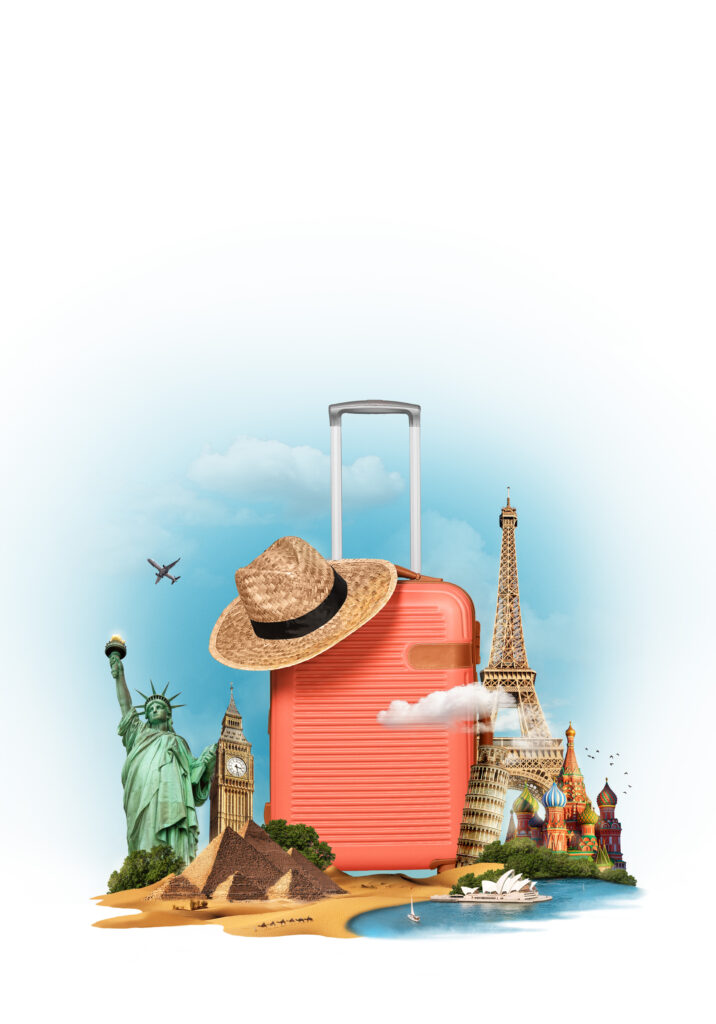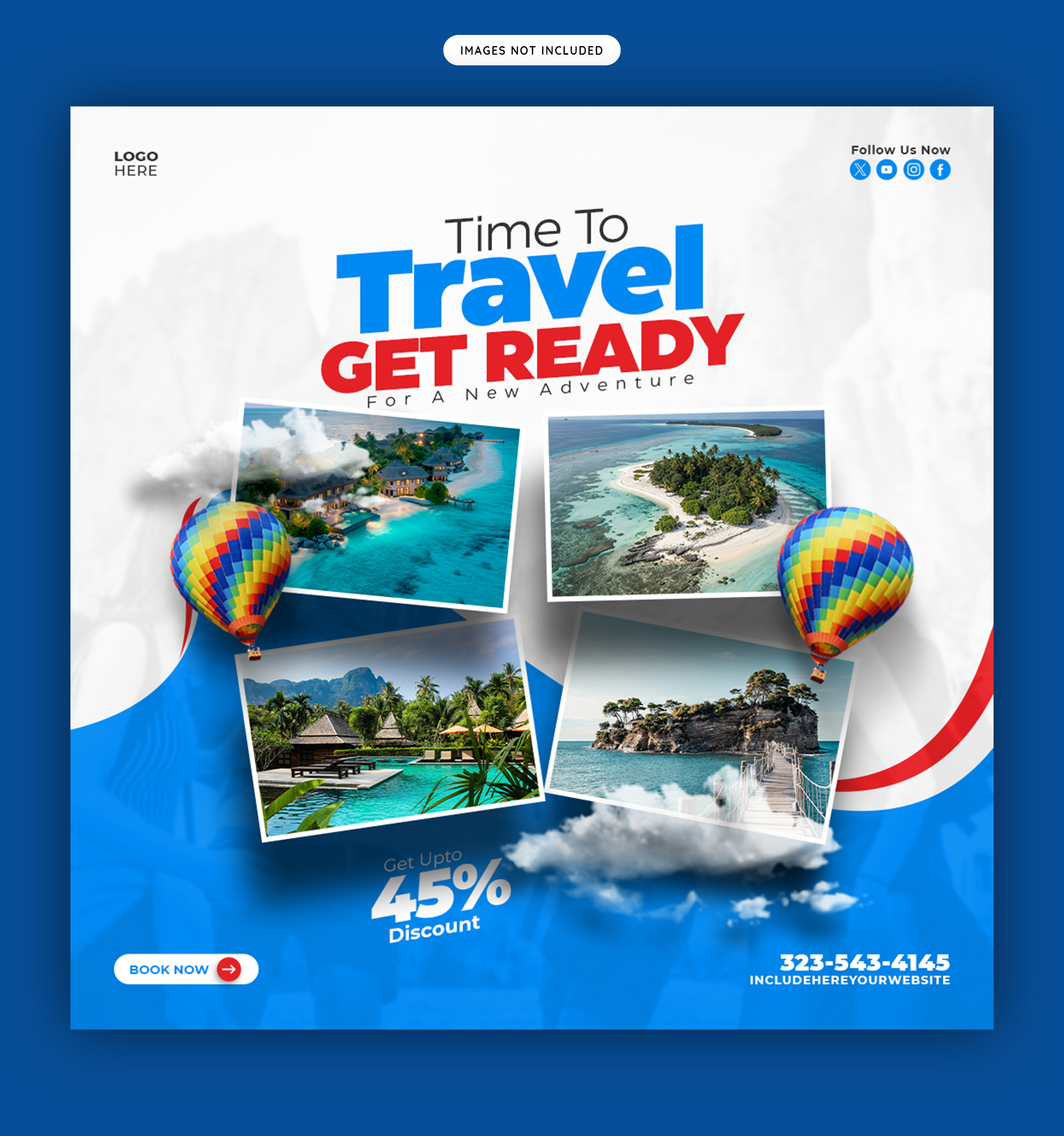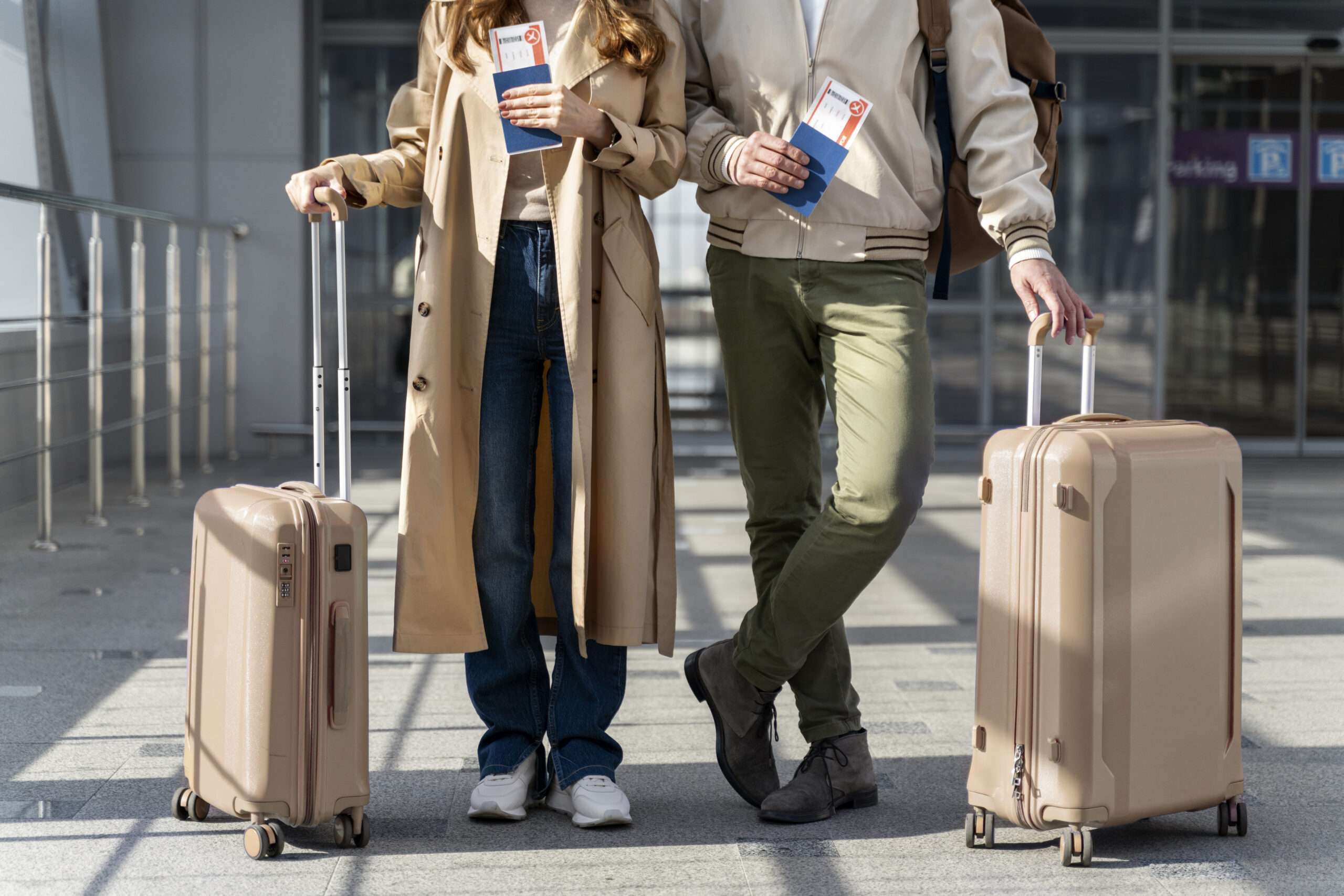Hey there, people who love to travel and want to go on adventures! As a top blogger who has traveled around the world without spending a lot of money, I have a secret to share: travel doesn’t have to cost a lot. With the right plan, your dream vacation can come true, and you’ll have great memories and a healthy bank account when you get back. In a time when every dollar counts, knowing how to travel on a budget is more than just a skill; it’s a superpower.
We don’t mean giving up comfort or real experiences. We’re talking about making smart choices, planning ahead, and having a little bit of insider knowledge that turns a scary price tag into a goal that can be reached. It’s not just about saving money; it’s also about making your money work harder, opening up new adventures, and giving you more time to explore the world.
So, if you’ve ever looked at beautiful travel photos and sighed, “I could never afford that,” get ready to change your mind. This complete guide, full of useful tips, is the best way to save money on your next vacation. Let’s get started and find out how to travel cheaply!
The Basics: Why Your Superpower Is Budgeting and Planning
Before we get into the details of cheap flights and cheap food, let’s make it clear that budgeting and planning strategies are not just helpful; they are absolutely necessary. They are the twin engines that turn your travel dreams from dreams into reality, making sure you save money and have a smoother trip.
The Myth of Travel That Costs a Lot
People often think that travel is a luxury that is only for the rich, which is one of the biggest reasons they don’t explore the world. Some kinds of travel are definitely out of reach, but most experiences are possible if you go after them with purpose. The idea that travel is expensive often comes from
- Last-Minute Choices: Being spontaneous can cost a lot. Almost always, booking flights and hotels at the last minute costs more.
- Not doing enough research: If you don’t know how much things cost, how to get around, or what free things to do, you might end up paying too much.
- Impulse Buying: When you’re on the road and don’t have a clear budget, it’s easy to fall for tourist traps or buy things you don’t need.
- Comparison Culture: Watching influencers go on trips that cost a lot of money can set an unrealistic standard. Your journey is your own, and it doesn’t have to cost a lot of money.
The first step is to get rid of this myth. Knowing that you can travel cheaply opens up a whole new world of options.
The Real Benefits of Strategic Planning
So, what is it about good travel planning that helps you save money? The effect is deep and wide-ranging:
The biggest benefit is that you save the most money. You can get the best prices on flights, hotels, and activities by doing research, comparing prices, and booking at the right times. If you book your flights and hotels early, you could save 10% to 30% or more. Source: NerdWallet
Less Stress: Worrying about money is a big source of stress. A clear budget and a well-thought-out plan can help with this, so you can really relax and enjoy your trip without worrying about your bank account all the time.
Avoiding Tourist Traps: Planning ahead lets you find real, local, and often cheaper things to do instead of falling for tourist traps that charge too much.
Better Value for Money: It’s not just about spending less; it’s also about getting more for what you do spend. Strategic planning makes sure that you spend your money on things that will really make your trip better, not on things that are too expensive.
Longer Travel Options: When you save money on one trip, you automatically start saving for the next one. In the long run, smart budgeting means more vacations.
Taking charge of your travel money gives you a sense of freedom and accomplishment because you know you’re going where you want to go.
By using strong budgeting and planning strategies, you’re not only saving money, you’re also getting more, better, and less stressful travel experiences.
Step 1: Save money and get ready for the trip
The road to an affordable vacation starts long before you even think about booking. The first step is to save money for your trip and get ready for financial success.
Setting Realistic Goals: How Much Do You Need?
You need a goal before you can save.
Pick a Place to Go (Tentatively): Even a rough idea will help you figure out how much it will cost. Is it a city that is known for being very expensive, like Zurich, or a hidden gem that is easy on the wallet, like Thailand?
Find out the average costs: Use sites like BudgetYourTrip.com or Numbeo.com to find out how much it will cost you to stay, eat, get around, and do things in your chosen destination.
Include Fixed Costs: Don’t forget about the cost of flights, travel insurance, and visas.
Make a High-Level Budget: Based on what you’ve learned, write down a rough budget. This will be the amount you want to save. For example, a trip to Southeast Asia might cost $50 to $100 a day, while a trip to Western Europe might cost $100 to $200 or more a day, not including flights. Source: BudgetYourTrip.com
Daily Life Hacks for Building Your Travel Fund
Now it’s time to start saving. This is where daily discipline and long-term travel dreams come together.
Automate Savings: Every payday, set up an automatic transfer from your checking account to a special travel savings account. “Out of sight, out of mind” works like magic.
Keep an eye on your spending: Use a budgeting app like Mint, YNAB, or EveryDollar to see where your money is really going. Find “leakage,” which are small, unnecessary costs that add up.
Cut Out Non-Essentials: Look over subscriptions you don’t use, eat out less, make coffee at home, or trade expensive hobbies for free ones. Every little bit really does help.
“No Spend” Days/Weeks: Set a goal for yourself to only buy the things you really need for a certain amount of time.
Side Hustle Power: Are you able to work as a freelancer, sell things you don’t need, or take on extra shifts? Put this money directly into your travel fund.
Meal Planning: Plan your meals and grocery shopping well to cut down on food waste and last-minute takeout orders.
Shop Smart: For everyday purchases, look for sales, use coupons, and compare prices.
How to Handle Your Money Wisely Before You Go
Travel Credit Cards: Look for cards that give you travel points, a sign-up bonus, and no fees for transactions made outside of the country. Use them wisely to earn points for flights or hotels. A lot of financial advisors say you should get cards that don’t charge foreign transaction fees. Source: Bankrate
Currency Exchange: Don’t exchange money at airports because they have terrible rates. If you can, use local ATMs with a debit card that doesn’t charge fees, like Charles Schwab or Revolut. Otherwise, go to a currency exchange service in town that has better rates.
Tell Your Bank: Always let your bank and credit card companies know when and where you are going so they don’t freeze your cards or send you fraud alerts.
Emergency Fund: Make sure you have a separate fund for emergencies and travel. This is for more than just vacation; it’s for life’s surprises. (Interlink: The Ultimate 2025 Travel Planning Guide: Charting Your Course to Unforgettable Adventures)
The “Travel Jar” Mindset: A Useful Tip for Everyday Life
Make a “travel jar,” either physically or digitally. Every time you save money (for example, by making coffee at home instead of buying it, packing your lunch, or skipping a takeout meal), put that money into your travel fund, either in your head or in your hand. This makes saving fun and gives you instant rewards, which strengthens the connection between your daily choices and your travel dreams.
Step 2: Learning How to Book Deals
This is where your planning and budgeting skills really come in handy when it comes to finding the best deals on travel.
Flights: When to book, how to be flexible, and smart search methods
Flights are usually the most expensive part of your trip. Learn how to do these things:
Everything is about timing.
Book Ahead: For international flights, it’s best to book 2 to 8 months in advance. Flights within the country can take 1 to 3 months. There isn’t a set “sweet spot” for international flights, but 3 to 6 months is a common range. Source: Skyscanner
If you can, travel during the shoulder seasons (spring and fall) or off-peak times to avoid the busiest times. Prices can be a lot lower.
Tuesdays, Wednesdays, and Saturdays are often cheaper days to fly in and out of the middle of the week.
Being flexible is good for you.
Flexible Dates: You can check prices for a range of days or weeks by using the “flexible date” search options on Google Flights or Skyscanner.
If you just want to go somewhere cheap, use the “Explore” feature on Google Flights or “Everywhere” on Skyscanner to find the cheapest places to fly from your home airport.
Smart Search Tips:
Incognito Mode: Always look for flights in incognito or private browse mode to avoid dynamic pricing, which happens when cookies make prices go up based on how many times you search for them.
Comparison Sites: Google Flights, Skyscanner, Kayak, and Momondo are all examples of aggregators that let you compare prices from different airlines and online travel agencies (OTAs).
Directly from the airline: After you find a good deal on an aggregator, go to the airline’s own website. They might have better deals or more flexible rules for canceling.
Think about budget airlines: Ryanair, EasyJet (Europe), Southwest (US), and AirAsia (Asia) are all budget airlines that can be very cheap for short-haul flights. However, be sure to read their baggage rules carefully to avoid extra fees.
Layover Tips: Sometimes, flights with longer layovers are less expensive. Take advantage of this by booking a layover long enough to visit another city for a.
Error Fares: Keep an eye out for very low “error fares.” These are rare and need to be booked quickly.
Places to Stay: More than Just Hotels—Smart Stays
You don’t have to spend a lot of money on a bed for the night.
Hostels aren’t just for students! A lot of them have private rooms, a great social scene, and planned activities, which makes them a great deal.
Guesthouses and B&Bs: These places are often run by locals and offer a more personal touch. Some even include breakfast.
Vacation rentals like Airbnb and Vrbo are great for families or longer stays because they have kitchens where you can cook your own meals, which saves a lot of money. Always read the reviews and the cleaning fees carefully.
House Sitting/Swapping: If you can be flexible, you can stay for free on sites like TrustedHousesitters.com in exchange for taking care of pets or a house.
Camping/Glamping: This can be very cheap for people who love nature and offers one-of-a-kind experiences.
Loyalty Programs: If you stay at the same hotel chain a lot, use their loyalty programs to get free nights or upgrades.
Book Direct (Sometimes): Booking directly with the hotel can sometimes get you better rates or perks, especially if you join their loyalty program. Aggregators are great for comparing prices.
Location vs. Price: If a hotel is well-connected to public transportation, it might be worth it to stay a little outside of the city center. Think about how much time and money it will take to get to work.
Getting Around on a Dime: Transportation
To get the most out of your travel budget, you need to be able to get around quickly and cheaply.
Walking is the best way to see a city, and it’s free! Your best investment is a pair of comfortable shoes.
Learn how to use the local metro, bus, tram, or train system. If they are cheap, buy passes that are good for several days. Travel cards are cheaper than buying single tickets in many cities. Source: Rough Guides—Travel Money Tips
Uber, Lyft, Grab (in Southeast Asia), and Bolt (in Europe and Africa) are ride-sharing apps that can be cheaper than regular taxis, especially if you share the ride with others.
Renting a bike is a great way to see cities or beautiful roads at your own pace.
Overnight Buses and Trains: You can save money on a night’s stay by taking a trip overnight.
Renting a car is only a good idea if you can’t use public transportation or you plan to go on long road trips. Always make sure you know your insurance options and how much gas will cost. Also, compare prices between companies.
Things to do and have fun: free fun and cheap things to do
You don’t have to spend a lot of money on experiences.
Free Walking Tours: Many cities offer free walking tours that are based on tips. These are a great way to learn about the area and get a general idea of what it’s like.
Parks and gardens: Visit national parks, city parks, and botanical gardens. Many of them are free or have very low entrance fees.
Free Museums and Galleries: Many big cities, like London and Washington, D.C., have world-class museums with free permanent collections.
Local Markets: Walk through food markets, flea markets, and artisan markets to get a feel for local life. You can often get free samples.
Street Art and Public Art: Take a self-guided tour of street art.
Find Free Events: Look in your area’s event listings for free concerts, festivals, or cultural shows.
City Passes: If you’re going to a big city, look into whether a city pass (like the London Pass or Paris Pass) is worth it for the sights you want to see. Carefully do the math; they don’t always save you money.
Discounts for students, seniors, and young people: Always ask if you can get one.
Book Tours Ahead of Time: If you book a paid tour online ahead of time, you may be able to get a discount compared to booking at the last minute.
A useful tip for everyday life is to become a “deal hunter.”
The same rules for getting good deals on travel also work for everyday purchases. Learn how to be a smart shopper:
Check Prices: Don’t buy the first thing you see. You can use comparison sites to find groceries, electronics, or services.
Check for sales, coupons, or loyalty programs before you buy something.
Buy used: For a lot of things, buying used is cheaper and better for the environment.
Take advantage of free local events. Instead of going out and spending a lot of money, look at your community calendar for free concerts, markets, or cultural events.
Phase 3: On-the-Ground Savings: Daily Discipline
Once you land, your budgeting and planning strategies are still very important. Making smart choices every day keeps your budget from going overboard.
Food and Drink: Eat and drink like a local
Food takes up a lot of your budget. This is how to deal with it:
Street food and markets are usually the best and cheapest places to eat. For example, night markets in Asia, taquerias in Mexico, or food trucks in Europe.
If you can get to a kitchen (like in a hostel or Airbnb), cooking even a few meals can save you a lot of money. Go to the grocery store in your area.
Lunch Specials: A lot of restaurants have lunch menus that are cheaper than dinner menus.
Picnics: Get food from a nearby market and eat it in a park or by a beautiful view.
Limit Alcohol: In some countries, alcohol can be very expensive. Enjoy it mindfully, or choose drinks that are cheaper and made in your area.
Reusable Water Bottle: Bring a bottle that you can refill whenever you can. Saves money and cuts down on plastic waste. This tip for saving money and being good to the environment is getting more and more attention. Source: Responsible Travel
Stay away from touristy restaurants because they usually have bad food and high prices. Go a few blocks away from the main attractions. Find places where a lot of locals go!
Happy Hours: Look for deals on drinks during happy hour.

Shopping and Souvenirs: Be Careful with Your Money
Set a Souvenir Budget: Before you go, decide how much you want to spend on gifts and souvenirs.
Buy Local: Support local businesses and artists. Don’t go to tourist shops that sell the same things.
Prioritize experiences over things: collecting memories and photos is more important than collecting things. It doesn’t cost anything to take a great picture of a local market that will last forever.
Postcards are a cheap, personal, and timeless way to remember someone.
Unexpected Costs and Contingency: The Emergency Fund
Things happen that you didn’t plan for, even if you are very careful with your budgeting and planning.
Buffer Budget: Always add 10–15% to your total budget for emergencies, last-minute plans, or unplanned costs (like missed flights, medical needs, or things you forgot).
Travel Insurance: This is very important, as “The Ultimate 2025 Travel Planning Guide” says. It’s a cost up front that stops big financial problems later. (Interlink: The Ultimate Passport to Peace of Mind: Your Complete Handbook on Travel Insurance for Safeguarding Your Adventures)
Keep Your Money Separate: Have a separate credit card for emergencies or a small amount of cash that you only use in an emergency.
The “Buffer Zone” Principle is a Useful Tip for Everyday Life
Just like you need a travel emergency fund, you should use the “buffer zone” idea in your daily life:
Don’t plan your day so that everything happens at once. Make sure to leave some time between appointments or tasks in case something comes up.
Financial Buffer: Set aside a small amount of money in your daily budget for small, unexpected costs, like a sudden repair or an unplanned outing.
Emotional Buffer: Take care of yourself by making time for it. This will help you avoid burnout and deal with daily stressors with more strength.
Different Ways to Travel and Save Money
One of the best things about budgeting and planning strategies is that they can be changed. Here’s how they work for different types of travelers.
Traveling Alone: Flexibility and Efficiency
Traveling alone gives you special chances to save money:
Lodging: Dorm-style hostels are the cheapest. Check for discounts on tours for people traveling alone.
Food: Enjoy street food and making your own meals. Finding single servings is easier.
Transportation: Use public transportation and walk a lot.
Flexibility: You don’t have to stick to any plans, so it’s easy to change them for better deals.
Interlink: Solo Travel: Your Ultimate Guide to Exploring the World Alone (An idea for a future article)
Family Travel: Group Discounts and Savings for Kids
When you travel with family, you need to use certain strategies:
- Vacation rentals are often less expensive than booking several hotel rooms and come with kitchens.
- Kids Stay Free: Find hotels that let kids stay for free until they reach a certain age.
- Bring your own snacks so you don’t have to pay too much for them at the store.
- Free Things to Do: Put parks, playgrounds, free museums, and outdoor adventures at the top of your list.
- City Passes: If you’re going to a lot of attractions, these might be a better deal for families.
- Group Discounts: Check to see if attractions give discounts for families or groups.
- Family Adventures: Planning Fun & Affordable Trips with Kids (Future article idea)
Adventure and Outdoor Travel: Guided Tours vs. Do-It-Yourself
DIY Where Safe: It’s cheaper to plan your own hiking or camping trips and carry your own gear than to go on a guided tour. But safety comes first; for activities that are dangerous, a guide is worth the money.
Permits and Fees: Before you go to a national park or trail, make sure you know what permits or entry fees you need.
Renting gear: If you’re only going on one trip, it might be better to rent specialized gear than buy it.
Cooking in Camp: If you’re camping, make your own food.
Sustainable Travel: Usually Doesn’t Cost Much
A lot of eco-friendly choices also save you money:
- Taking public transportation or walking instead of taking a taxi or renting a car can help the environment and save money.
- Reusable items like shopping bags, coffee cups, and water bottles save money and cut down on waste.
- Local and seasonal food helps local economies and can be less expensive than food from other countries.
- Eco-Accommodations: Some eco-lodges are simple, but they offer great value and one-of-a-kind experiences.
Interlink: Your Guide to Eco-Friendly Travel: Minimizing Your Footprint
Using Travel Perks and Technology to Go Beyond Your Budget
These new tools and programs will help you with your budgeting and planning.
Cards for loyalty programs and travel rewards
Airline Miles: You can earn miles by flying or using co-branded credit cards. You can use them to get free flights or upgrades.
Hotel Points: Get points for staying at a hotel and use them to get free nights.
Credit Card Sign-Up Bonuses: These can be very profitable because they let you quickly earn a lot of points or miles, which is often enough for a free flight or a few nights in a hotel. Always read the fine print and make sure you can responsibly meet the spending requirements.
Spend wisely: Use the right card for different types of purchases, like groceries, travel, or dining out, to get extra points.
Apps that help you save money
Flight and hotel search engines include Skyscanner, Google Flights, Kayak, Momondo (for flights), Booking.com, Airbnb, and Agoda (for hotels and rentals).
Mint, YNAB, and TravelSpend are all budgeting apps that let you keep track of your spending on the go.
XE Currency: Currency Converters.
Google Maps (download areas for offline use) and Maps.me are two offline maps.
Uber, Lyft, Grab, and Bolt are all ride-sharing services. Check to see if they are available in your area.
Apps for reviewing restaurants: TripAdvisor, Yelp, and Google Maps (for finding local, non-touristy places to eat).
VPN: To keep your information safe on public Wi-Fi and sometimes to find deals that are only available in certain areas (though this can be hard).
A useful tip for everyday life: Use loyalty everywhere.
Use the loyalty program way of thinking in your daily life.
Don’t leave money on the table when you use your supermarket loyalty card.
Coffee Shop and Restaurant Loyalty Programs: Sign up if you go there often.
Use credit cards wisely. Use cards that give you points for your everyday expenses, like groceries, gas, and bills, so you can save up points even when you’re not planning a trip.
Useful Tips for Everyday Life: Using What You Know About Travel Budgets
The lessons you learn from Saving Money on Your Next Vacation can help you plan your trips, but they can also help you live a more intentional and financially smart life.
Spending with care and setting priorities
The “Travel or Buy?” Test: Before you buy something on a whim, ask yourself, “Do I want this, or do I want to use this money for my next trip?” This simple question will help you see things clearly.
Travel planning makes you think about what you need and what you want. Use this kind of thinking on your daily budget. Make a distinction between needs and wants.
Delayed Gratification: Putting off getting what you want right away in favor of a bigger, more rewarding long-term goal (like a dream trip) helps you learn how to control your money, which is good for all parts of your life.
Value-Driven Decisions: When you plan a trip, you think about value instead of price. Use this in your daily life by asking yourself if something is really worth it or if you just want it for a short time.
The Strength of Saving Small
The “Latte Factor” in Reverse: Instead of complaining about small costs, be happy about small savings. When you pack lunch, walk instead of drive, or skip a pointless purchase, remember that you’ve just saved money for your next trip.
Round-Up Apps: Use banking apps that round up your purchases to the nearest dollar and put the extra money into savings. It’s easy to save.
Found Money: Put any money you get that you didn’t expect (like bonuses, tax refunds, or gifts) straight into your savings goals.
Living a Life of Frugality
Being resourceful means learning to make do with less when you travel or coming up with creative ways to save money, like having picnics instead of expensive meals.
Less Waste: Using things like water bottles and coffee cups over and over again becomes second nature, which saves money and helps the environment.
Experiences Are More Important Than Things: The happiness that comes from traveling often outweighs the happiness that comes from owning things. If you change the way you think, you might be able to live a more fulfilling life by putting memories and relationships ahead of “stuff.”
“Is this worth the trip?” This is a fun question to ask before you buy something expensive. Will this thing make me as happy as an experience would?
Conclusion: Your Wallet Is Your Ticket to More Fun
The idea that only rich people can travel is an old one. With the right budgeting and planning strategies, the world will be within your reach in 2025. Every choice you make, from the first spark of inspiration to the daily decisions you make on the road, can either open doors to new adventures or close them.
This guide has given you a complete set of tools to help you find great deals, save money on things you don’t need, and build a strong financial base for your travels. More importantly, it has shown you that the discipline, creativity, and foresight needed to plan a smart trip are skills that will help you in every area of your life.
So, stop daydreaming and start acting. Use these tips, make good decisions, and watch your travel fund grow, turning vague goals into real plans. You don’t have to wait long for your next vacation, which will be full of real experiences and memories that will last a lifetime. Happy saving and even happier trips!
source:
[The Ultimate 2025 Travel Planning Guide: Charting Your Course to Unforgettable Adventures](/blog/ultimate-2025-travel-planning-guide-effective-difference) (Crucial link, as this article expands on planning)
[The Ultimate Passport to Peace of Mind: Your Complete Handbook on Travel Insurance for Safeguarding Your Adventures](/blog/travel-insurance-handbook-safeguarding-adventures) (Directly links to a detailed guide on insurance)
[Your Guide to Eco-Friendly Travel: Minimizing Your Footprint](/blog/eco-friendly-travel-guide) (Future article idea, related to sustainable travel)














